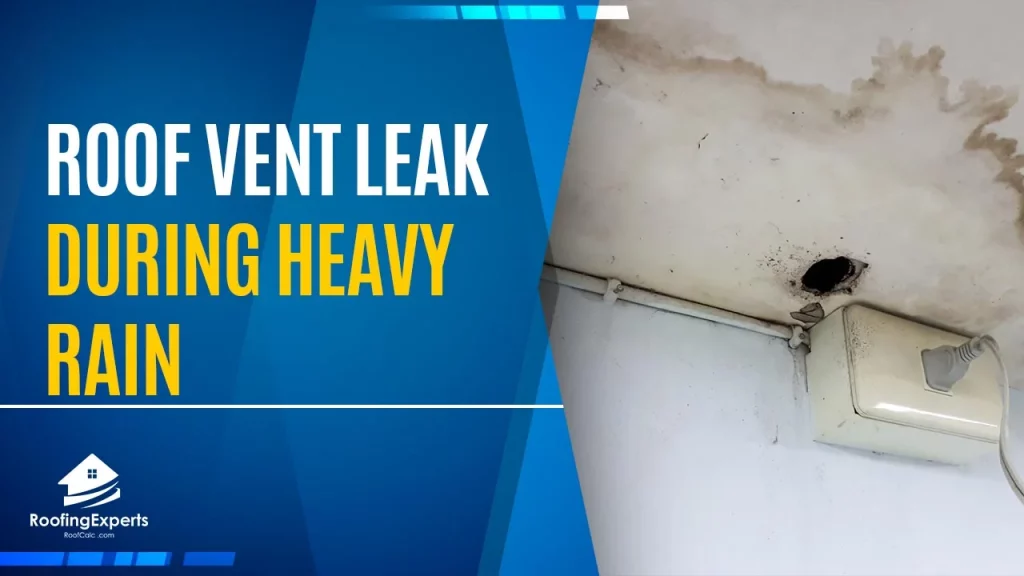
A roof vent is a hole in the roof that allows air to flow from inside of your home. They come in all shapes and sizes, but they’re typically found near the top of walls or ceilings.
This can be especially useful for areas such as attics where hot air builds up during warmer months. In this blog post we tell you what to do when you experience Roof Vent Leak During Heavy Rain!
It doesn’t matter how well a roof is built, if the venting system isn’t installed properly, water will simply leak in.
During heavy rain, the more likely it is that your roof vent will leak. If you get water in through any opening on your building, be sure to fix the problem quickly before mold starts growing and before other damage occurs.
This blog post will discuss some of the symptoms of this problem and steps to take to prevent it from happening again.
How Does a Roof Vent Work?
Roof vents are typically made from metal, fiberglass or plastic. They have a spring-loaded cover that opens and closes to allow air in but keep out rain and snow.
Over time however, this system can break down due to wear and tear caused by the elements such as wind, sun exposure or even debris build up around them.
How to Quick Fix a Roof Vent Leak During Heavy Rain
If you have a leak in your roof vent during heavy rain storms, you can try to stop it immediately. To do this:
- Use a bucket or any other waterproof container to catch the water that’s leaking in.
- Place a towel or other absorbent materials inside the vent to soak up any water that’s still coming in.
- Purchase some metal caulk and use it around your roof vent to seal off any cracks, gaps or spaces where water might be getting through during heavy rain storms
- Place an additional piece of wood on top of your vent, covering it completely and sealing off the area where you’re seeing leakage.
- Screw this piece of wood into place using screws long enough to fully push through whatever surface they are being screwed into.
- Clean up any water that’s leaked inside and dry the area completely before using it again to prevent mold growth or other damage.
- If you’re not comfortable with doing this yourself, call a professional who can do it for you quickly like The Roofing Company.
With these helpful ways to fix a leaking roof vent during heavy rain, you can stop damage to your property and prevent problems from occurring in the future.
What Causes a Roof Vent to Leak?
A variety of things can cause a roof vent to leak. Some of the most common causes include:
- The spring system becomes loose and not sealing properly, allowing rainwater in through the gap that’s formed.
- Debris such as leaves or branches gets into the path that allows water to flow inside off your house.
- Plastic or metal vents are slowly worn away by the sun, which can allow water in through any cracks that form.
- The vent does not fit into its designated space correctly and is unable to keep out rainwater because of this.
What Are the Signs of a Leaking Roof Vent During Heavy Rain?
If you see any of the following signs, it’s time to take preventative measures.
- Water is entering your home through vents or outlets that are located near roofs during heavy rain.
- You have a lot of condensation inside on walls or ceilings caused by excess moisture in the air. This can be especially true if they’ve recently been painted.
- There’s a lot of moss growing on the roof, indicating that water is leaking in through your vent and pooling up there during heavy rain storms.
- The roof is sagging or leaning, which can be a sign that there’s too much weight on it and the vent has started to buckle.
Final Thoughts
If you’re still reading, we hope that this blog post has helped to shed light on some of the most common causes and solutions for roof vent leaks. The best way to avoid a roof vent leak is preventative maintenance.
Locate, seal and repair all leaks before they can cause serious damage. These three steps you should take immediately if you have a possible ventilation system leak during heavy rain.


